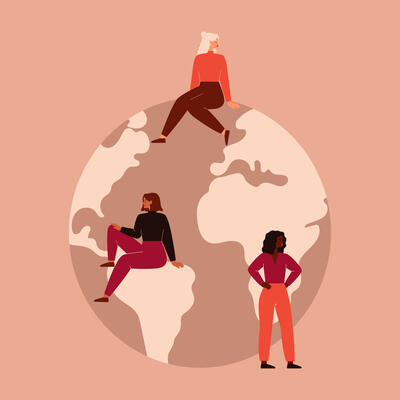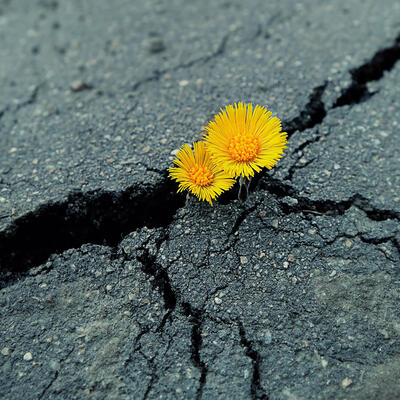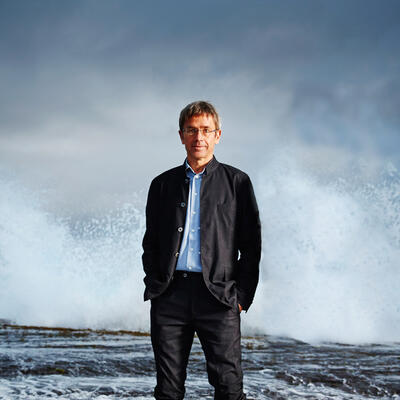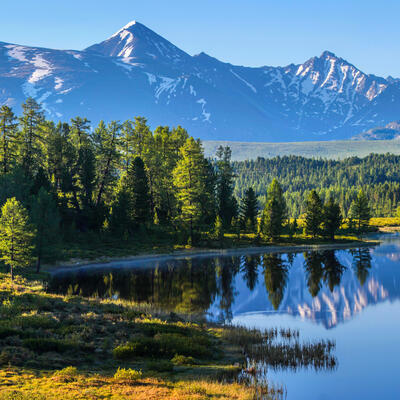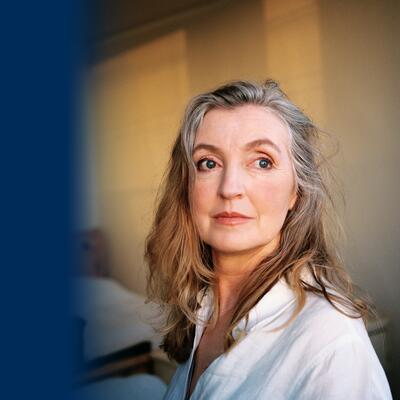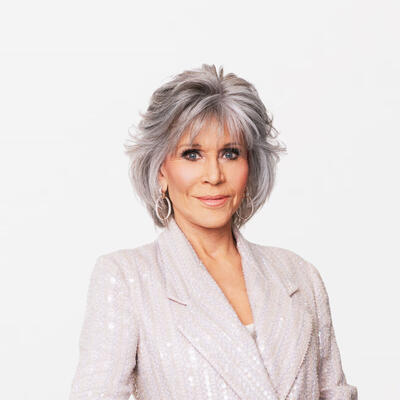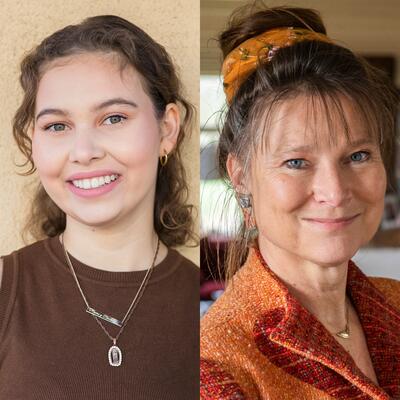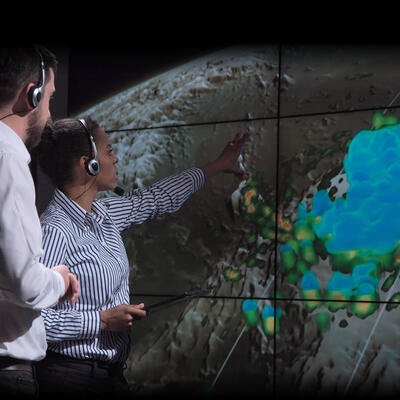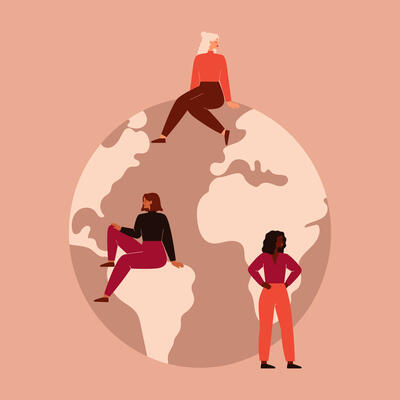
REWIND: A Feminist Climate Renaissance
Guests
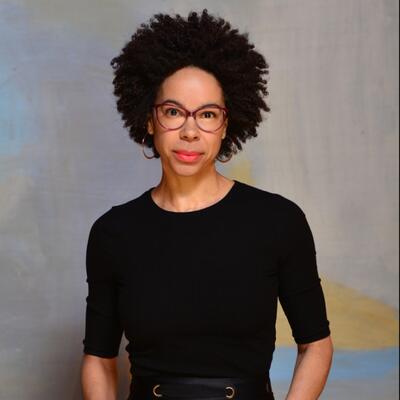
Ayana Elizabeth Johnson
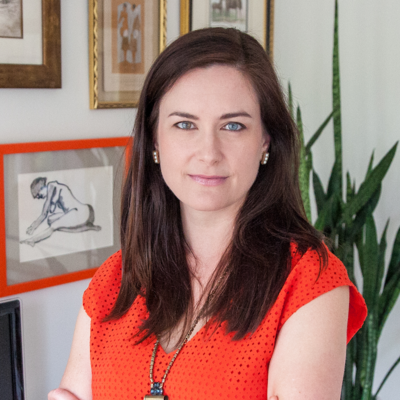
Katharine Wilkinson
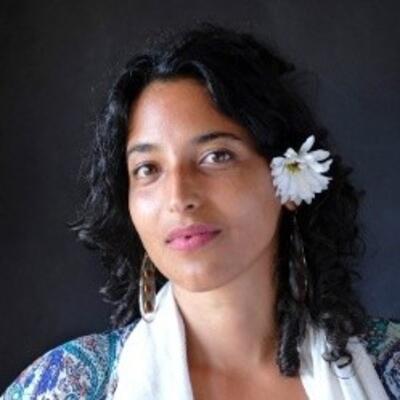
Christine Nieves Rodriguez
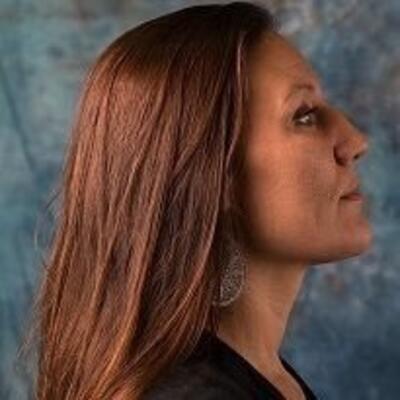
Sherri Mitchell - Weh’na Ha’mu Kwasset
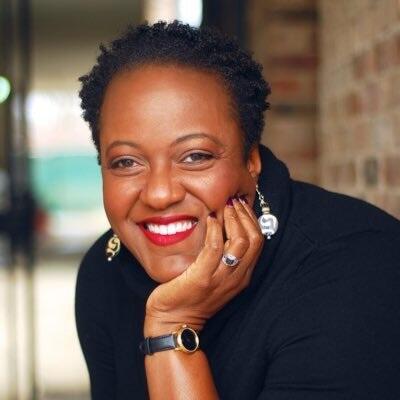
Heather McTeer Toney
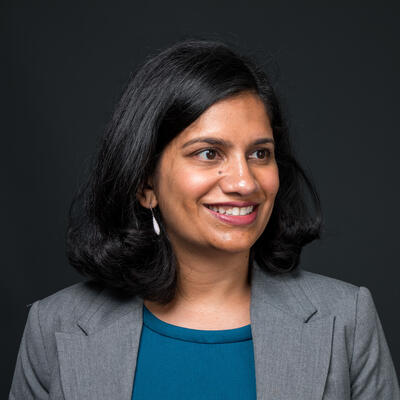
Jainey Bavishi
Summary
Can a feminist renaissance save the climate?
A feminist approach to the climate conversation begins over a hundred and fifty years ago. That’s when a scientist named Eunice Newton Foote first recognized the heating effect of C02.
“And she made this discovery by using, you know, glass bells and tubes with gas in her backyard in 1856,” marvels author Ayana Elizabeth Johnson. “She was the first person to connect the dots between carbon dioxide and planetary warming, and history basically forgot her.”
Johnson and co-editor Katharine Wilkinson tell Foote’s story in the introduction to their anthology, All We Can Save:Truth, Courage and Solutions for the Climate Crisis. The collection brings together the voices of women artists, writers and change makers who are at the forefront of climate action.
Foote’s predictions about climate change have become all too real. But as we’ve tried to engineer our way to a solution, the systemic underpinnings of the problem have been harder to address.
“When you start to dig deeper, you start to see that the roots of the challenge are actually in extractive capitalism, which is entangled with racism, white supremacy and patriarchy,” says Wilkinson. “It would be easier to solve if it were only an engineering problem. But it just isn't, because the things that are at stake are more complicated – and so, the solutions that we need are also more complicated.”
“The work that we’re doing is instigating or nurturing a feminist climate renaissance,” says Johnson, “which is what we feel the climate movement so desperately needs right now.”
RELATED LINKS:
All We Can Save: Truth, Courage and Solutions for the Climate Crisis
Sacred Instructions: Indigenous Wisdom for Living Spirit-Based Change (Sherri Mitchell)
Full Transcript
Greg Dalton: Can a feminine renaissance save the climate? Climate One’s empowering conversations connect all aspects of the climate emergency. I’m Greg Dalton. The work of reducing carbon emissions sometimes gets reduced to just electrifying transportation and replacing fossil fuels with wind and solar power. But there are many who advocate for a more holistic approach --
Katharine Wilkinson: When you start to dig deeper, you start to see that the roots of the challenge are actually in extractive capitalism, which is entangled with racism, white supremacy and patriarchy.
Ayana Elizabeth Johnson: We just need to be much more creative and collaborative, collective, less driven by ego, more driven by curiosity and creativity...and these more nurturing, mending approaches tend to be stereotypically considered more feminine.
Greg Dalton: That was author and strategist Katharine Wilkinson, former editor-in-chief at Project Drawdown and marine biologist Ayana Elizabeth Johnson. In their book, All We Can Save: Truth, Courage and Solutions for the Climate Crisis, the two bring together the voices of women artists, writers and changemakers who are at the forefront of climate action. Later in the show we’ll hear from some of the writers featured in the book.In their introduction, Johnson and Wilkinson begin with the story of a climate science pioneer -- one I’m embarrassed to admit I had never heard of until I read their book. Ayana Elizabeth Johnson tells us her story.
Ayana Elizabeth Johnson: Eunice Newton Foote was a scientist and she discovered that carbon dioxide, excess carbon dioxide in the atmosphere would lead to planetary warming. And she made this discovery by using, you know, glass bells and tubes with gas in her backyard in 1856. She was the first person to connect the dots between carbon dioxide and planetary warming and history basically forgot her. And we are determined that history will not be able to continue forgetting her because she is not only one of the first climate scientists, but also was a feminist, signed the Seneca Falls declaration. And so Katharine and I consider Eunice Newton Foote to be the first climate feminist which is important to us because what we term the work that we’re doing is instigating or nurturing a feminist climate renaissance which is what we feel the climate movement so desperately needs right now.
Greg Dalton: Katharine, climate has long been framed as an engineering problem grounded in chemistry and physics; swap-out certain kinds of electrons and molecules for other. What are the gender implications of looking at climate from an engineering perspective?
Katharine Wilkinson: Well, we just rolled off an interview when Ayana said like would that this were only an engineering challenge, right? Like would that some engineers could, you know, hole up and kind of this, you know, engineer their way to solutions. I think you know where we have come up short is we have failed to ask the question of where are those excess molecules coming from and why is it so hard to address the sources of that problem. And so, when you start to dig deeper, you start to see that the roots of the challenge are actually in extractive capitalism, which is entangled with racism, white supremacy and patriarchy. Wish it weren't also tangled, right, it would be easier to solve if it were only an engineering problem. But it just isn't because the things that are at stake are more complicated. And so, the solutions that we need are also more complicated. And when we think about the gender dimensions in particular, we see that women and girls and non-binary folks are disproportionately harmed by the impacts of climate. And that's especially true under conditions of poverty, for folks who are rural, live in the global south, women and girls who are indigenous, black of color. These things start to intersect and because climate is a vulnerability multiplier or we might think of it as an injustice multiplier, it has that effect on people's lives and communities. But all too often that's where the conversation stops, right, that well, there’s just sort of a victim situation here. But one of the things that I really learned from Mary Robinson, former president of Ireland who of course is such an incredible leader in this space for so long and a self-proclaimed angry granny for climate justice, is that when you are closer to the problem, you’re necessarily closer to the solutions. And so that's the part of the story that's actually the most important and Ayana and I think it's the part of the story that has been way too neglected.
Greg Dalton: Ayana, when you're close to the problem maybe there's some shame and culpability and therefore resistance to recognizing the interconnectedness that Katharine just talked about. I find that younger people see that interconnectedness and older people. What do you see?
Ayana Elizabeth Johnson: I think there’s two different kinds of being close to the problem, right. There’s the kind Katharine was just talking about, which is you’re experiencing the impacts of climate change. And then there's close to the problem like you are creating the problem. Like you are the fossil fuel companies you are the politicians that are stopping progress. You are people who are rejecting excellent climate science that we need to be making decisions on. And, you know, those are two very different things. And so, when we think about the work that so very much needs doing it’s allowing people who are living in communities that are bearing the brunt of the climate crisis to have a seat at the table, a leading role in crafting what those solutions look like. Whether you are a community in the Gulf that’s getting pummeled by hurricanes, a community on the West Coast dealing with fire. We need to, you know, come up with whole new ways of living within nature on this planet and with each other. And so that is the situation in which we find ourselves where we just need to be much more creative and collaborative, collective, less driven by ego, more driven by curiosity and creativity, and an understanding of the, you know, communal stake in the outcome. And these more nurturing mending approaches tend to be stereotypically considered more feminine. And so that is the energy, the perspective, the expertise that finds itself throughout this book in addition to the rigorous science. In addition to the deep knowledge of agricultural practices. In addition to legal prowess. It is the ways in which we use those tools that I think hold so much potential for just a completely new wave of leadership which is clearly what we need because you know the leaders we’ve had to date have certainly not gotten us where we need to go.
Greg Dalton: My guests are Ayana Elizabeth Johnson, a marine biologist and co-editor of the book, All We Can Save. And her co-editor Katharine Wilkinson, co-host of the podcast A Matter of Degrees. We recorded this conversation in 2020, soon after the passing of Supreme Court Justice and feminist icon Ruth Bader Ginsburg. At that time, I asked Dr. Johnson about Ginsburg’s environmental rulings and role in the feminismovement.
Ayana Elizabeth Johnson: I'm not very familiar with her environmental legacy, but certainly with her feminist legacy and the way in which she is both powerful and feminine at the same moment I think is really quite inspirational, an absolute expert and a titan in her field. You know, and a devoted you know grandmother at the same time, like really caring about the nurturing across generations and not taking any crap. And that combination of just sort of intellectual might and an ability to get things done persuasiveness expertise. And then also you know saying this is the work of generations this is the need to transform society. This is a need to shift the status quo. And when will there be enough women on the Supreme Court, when there are nine, I mean there were nine dudes here before, like why couldn't it be nine women one day, right? And so, as we approach this work of supporting women climate leaders and nurturing this feminist climate renaissance, there are certainly elements of the way that she leads that are very inspirational. And I think the association of the feminine with weakness is one that we absolutely need to shatter because that is simply untrue. I mean anyone who can birth a child, like miss me with calling feminine power weak. And so, there's this opportunity to say like where is the strength, the creation, the nurturing the mending and those are all feminine attributes that anyone can manifest, right. How do we leave behind individuality and ego and like adherence to facts without context and instead say we need a welcoming collective communal creative nurturing approach to climate solutions that ensures that everyone can find their role in this work? And that it’s a renaissance and not a revolution it is a rebirth and a moment of creation, not a moment of destruction. It's the destruction in fact that we need to stop.
Greg Dalton: You mentioned patriarchy and racism was mentioned earlier. And I’d like to ask Ayana, I understand how systemic racism affects people of color like yourself, hurts people like yourself. How does it also hurt privileged white men like me?
Ayana Elizabeth Johnson: Would you like a habitable planet yes or no?
Greg Dalton: Yes.
Ayana Elizabeth Johnson: You’re for it. Well we can't have that without people of color. We need everyone being able to do this work, right. We know that more people of color care about climate change than white people do. Like this is such a misconception, right, that this like, you know, the environmentalist is some white guy with a Patagonia jacket and like a Prius or whatever like a Volt and backpacks all the time. But the reality is that people who care most about the environment are more likely or vote like they care more about the environment are more likely to be Latina grandmas in Arizona than college students in Massachusetts. And this is according to data from the Environmental Voter Project. And we know that, you know, 49% of white people are concerned about climate change compared to 57% of black people and 69% a lot next people. So, there's like a very tactical answer to this question, which is like we need to dismantle white supremacy if we want to have a chance at addressing the climate crisis with the speed and scale that's required. Because we need to build the biggest team, which means we should definitely be reaching out to all people who already care. Meanwhile, climate deniers are, you know, a single- digit portion of the American population, something like 8%, but it's mostly conservative white men. So, you know this is a bit glib but I think we could probably solve the climate crisis without racists, but we can't solve it without people of color. And I think that's important to frame it in terms of who is bringing energy toward solutions. How can we unburden people of color from white supremacy and racism, men and police brutality and mass incarceration? So that all of that energy that’s spent fighting for racial justice can then be directed towards other things that they already care about and climate is one of those. We often talk about race and climate as like oh poor people of color getting pummeled by impacts from climate change, which is only one half of the story. That is for sure accurate that those communities are getting the brunt of what's happening because of the history of historical marginalization and under resourced and all sorts of things that are baked in in terms of policy. And so that is one side of it but the other side is like these are also people who have incredible ingenuity to help bring these solutions forward. And so that is back to the same thing that where Katharine started us, which is, you know, people who are close to the problems are also close to the solutions. And as a marine biologist one of the most informative moments of my career was interviewing fishermen across the Caribbean and asking them if they could write the laws to manage the ocean what would they be. And I learned so much from those answers they had been thinking about this their whole lives like what would the better way look like. And so, asking people in communities how they would like to manage this transition to hundred percent renewable energy to decarbonizing transportation to overhauling our food system to make agriculture regenerative to changing buildings and making them efficient to shifting manufacturing. All of these are areas where people like normal people who are dealing with these systems every day have a great insight to share if we would just suppress our hubris for a second and ask them for their thoughts and input. Instead of saying like we are the experts from on high and we will decree to these communities what they should do. It’s just not – I don’t know how to say it, it’s like it’s just not gonna work like that. That never works right, you never have some like outside expert come in and say like if you do, you know, these items 1 through 59 then all of a sudden like everything will be fine. We need to have people from every community, leading every community. We need to be taking culture into account as we manage this massive transformation. This is not in fact a technical problem this is a problem of how society is structured as Katharine has said, you know, the climate crisis is really just a sort of a manifestation of everything that's wrong with other systems, right. Other systems being out of balance; our industry our, you know, patriarchy and white supremacy and sort of like exploitive extractive capitalism have created this problem. And so the naïveté to think that we could somehow like magically engineer a solution that doesn't address the root problem is sort of quaint and, you know, we’re gonna need to dig a little deeper if we’re gonna actually get to the root of this and craft a way forward that is actually going to work.
Greg Dalton: You’re listening to a Climate One conversation about the importance of community, collaboration and compassion in addressing climate disruption. I’ve been talking with Ayana Elizabeth Johnson and Katharine Wilkinson, co-editors of the climate anthology All We Can Save. Coming up, what indigenous wisdom can tell us about the earth’s history - if we listen.
Sherri Mitchell: When we express that using our own language, and saying you know the rocks are our elders...and that they carry billions of years of stories, which is a different way of saying we have geological information. People discount that and say, oh that’s just magical thinking.
Greg Dalton: That’s up next, when Climate One continues.
Greg Dalton: This is Climate One. I’m Greg Dalton. We’re revisiting a conversation about seeing the climate crisis through a feminist lens as portrayed in the book All We Can Save. My next guests are two leaders, working to foster climate education and leadership, rooted in indigenous and community wisdom. Sherri Mitchell is a Native American attorney, teacher and activist and author of Sacred Instructions: Indigenous Wisdom for Living Spirit-Based Change. Christine Nieves Rodriguez is Co-founder and President of Emerge Puerto Rico. Rodriguez grew up in Puerto Rico. She left the island at age eighteen to attend the University of Pennsylvania, with no intention to return.
Christine Nieves Rodriguez: I felt that there were no opportunities for me in Puerto Rico. And part of that was something I have learned through things I had heard around me. And I had also learned that there was always something better out there. There was always something better, greater and opportunity was elsewhere. So, when I packed my bags, I had no intention of returning to Puerto Rico.
Greg Dalton: You also write that you felt bitter about the corruption and inequality in Puerto Rico and kind of absorbed something of a colonial mentality.
Christine Nieves Rodriguez: Yeah, it’s very common I would say that constant, that narrative of being bitter has only gotten I would say even worse, since the hurricane. But I used too, I grew up hearing so much disdain towards the government, towards the political class, so to speak. And there was this kind of assumption that leaving that somehow the Western world had superior better, more innovative ideas or solutions or options for me. Of course, I later found out how all of this was false and it was part of a series of many generations of stories that we’ve told ourselves and believed about ourselves.
Greg Dalton: And after earning degrees at Penn, Oxford and Princeton, you did return to live near where Hurricane Maria first made landfall during the storm that killed 3,000 people. You’ve crammed yourself into a tiny bathroom with your pets and your cousin Luis. When you emerged hours later, what did you see and how did you feel at that moment after Maria?
Christine Nieves Rodriguez: When -- wow, you know, the bathroom is right here, it’s just right down this hallway. And you know we walked out and we looked outside and everything was destroyed. It felt like a bomb had exploded. And I just couldn't understand it was like we had experienced hurricanes before but this wasn't like a hurricane. This was like a giant tornado had been stationed on top of our home and the destruction was so vast that we just felt completely lost. It was this feeling of utter despair and loss.
Greg Dalton: Sherri Mitchell, when Christine left Puerto Rico, she said she bought into a sense of self defined by Columbus and colonialism stories told over generations. As an indigenous woman, have you ever had a similar feeling of inferiority based on stories that are told across generations?
Sherri Mitchell: I think that what's interesting about that is that I think we all relate to those feelings in different ways. And so, for us, knowing that there is an attitude of inferiority held by those around us toward us influences the way that we engage the world. We may not feel that we're inferior ourselves but when those around you view you as being less than human in many ways then you certainly form a relationship with that identity that they hold for you, and it informs your decision in your walk through the world. So, I can understand having an engagement with that identity even though I may have engaged in it from a different perspective.
Greg Dalton: Something that kind of you absorb from the way people see you and view you and think about you. So, Sherri, how is the conquest mindset of colonialism alive today and impacting our ability to sustain life on the planet as climate disruption gets more severe?
Sherri Mitchell: Well, I think that, you know, this whole concept of conquest is something that's been deeply embedded into the minds of people who are alive today on the planet. We have 17 to 21 centuries of conquest and colonization that we've all been embroiled in collectively. Individually we have our own stories. And so, we have this deep embedding with this idea that conquest is the way to achieve our goals. Conquest is the means by which we succeed. Conquest is the path toward ensuring our survival. And so, all we continue to do is to perpetuate cycles of conquest by engaging in these repetitive cycles of harm and displacement of one replacement of the other, on and on, you know, until there's no one left essentially. And one of the things that I realized during an experience that I had in my life where I actually was quite ill for a period of time. So, I had a certain amount of energy to invest in the work that I was doing during the day. And I quickly realized that when I was engaging in conquest type activism, when I was engaging in destructive or deconstructive activities, I would be exhausted for days afterwards. When I was being engaged in life-affirming activities then it would leave me uplifted for days. And so I began to realize that when we engage in conquest not only are we harming the other, but we’re harming ourselves as well. And that if we truly want to be able to create a new pathway forward then we’re gonna have to do that with new ways of thinking that are not connected to the old ways of thinking that have delivered us to this place. And I think we all understand that. There had been a number of quotes about that in different formats over the years that, you know, you can't use the master’s tools to dismantle the master's house. And so, if we want to have a world that is not governed by and dominated by violence then we have to be willing to engage one another in ways that are not only nonviolent but that are not conquest oriented.
Greg Dalton: If you’re just joining us my guests are Sherri Mitchell, a Native American attorney, teacher and activist. She is author of Sacred Instructions: Indigenous Wisdom for Living Spirit-Based Change. And Christine Nieves Rodriguez, a speaker and writer she’s co-founder and Executive Director of Emerge Puerto Rico, a climate change leadership organization. Sherri, you write that now that white people are scared about the director of the civilization, they built they’re turning to indigenous people whose lands hold a great deal of remaining biodiversity, etc. So, tell us how people are looking to indigenous cultures for guidance help at this moment when the Western civilization is in crisis.
Sherri Mitchell: I’m gonna take your word for it that I said they were scared. I guess that now that there’s an impact, you know, I don't think enough people are scared enough yet. But I think that people are certainly aware that they are beginning to be inconvenienced and they just don't know the degree of inconvenience that's coming their way. And so, you know, I think that one of the things that's true about capitalism and also colonization is that it has no endpoint. And so, when it reaches what looks like a natural endpoint it turns around and begins to cannibalize itself. So those who were within the original settlers set who believed that they were safe because they were part of the protected class are now being impacted by the same behaviors that have been impacting us for decades. And so, you know, this belief that we’re somehow separate from the consequences of our actions is an illusion that we have to shed. So, I think that that illusion is starting to evaporate before the eyes of a lot of people who have been favorably situated within the white population for a very long time and who have been comfortable within that position and who didn't think that they were in any danger of having any type of impact. And who also were blissfully unaware of the impacts that others were experiencing while they were living their comfortable lives. And so, you know, this is a time where the sun is at high noon and everything that's been in shadow is being exposed and depending on the time of day that you're living in some people are just waking up. Others have been awake for a very, very long time. And then you know you're starting to see that this light is may be hurting your eyes a little because you're just waking up or you're seeing that there are things that are being illuminated that you hadn't quite seen but you are aware that there were some things that were very wrong and now your vision is expanding. And so, you know, I think that we are seeing this experience unfold in a lot of people's life of deep painful awareness of what has been for very long time for a lot of other people. And that realization creates, I think a sort of panic within people where they don't know how they're going to avoid that pain which is our natural instinct is to avoid pain. Because they see the ways that indigenous peoples have suffered around the world as a result of colonization and capitalism and now climate change. We’ve been on the frontlines of climate change as well and they don't want to experience that pain but there's no way now to avoid the consequences of that behavior. You know the chickens are coming home to roost, is that what they say? And so, there is a greater realization I think that we are in fact in this together. And a greater willingness to look for some type of common pathway out of it, but also to acknowledge the incredible expertise that can be found in traditional indigenous ecological knowledge.
Greg Dalton: And you both write the solution to that pain that awareness. Awareness brings pain and people want to either avoid that pain or, you know, stop it, is kinship or community. So, Christine first in terms of how kinship and community which you came back to Puerto Rico seeking, does that ease the pain of climate change if we somehow, you know, I think a lot of solutions to climate change are like build walls, technological fixes. And you both seem to be saying a solution to climate pain is human connection and kinship.
Christine Nieves Rodriguez: It’s a different way of relating. I definitely felt that community was medicine. Community was medicine when everything collapsed. And I started calling it infrastructure because everyone knows the importance of infrastructure the physical infrastructure, but there comes a moment when and we will continue to see this when our communication, our power, our water, infrastructure start collapsing. But there’s something that doesn't collapse and to me that became so evident I just saw it so clearly. That what really makes it possible for humans to be able to overcome the profound grief of losing everything, not just physically in terms of our things but also naturally in terms of our surroundings and our land. Really what makes it possible to survive and go through this darkness is really our capacity to come together. And that is determined by how much we have invested in knowing our neighbors and in working through processes that are difficult, working through conflict. You know are you going to be the person who's gonna check in on your neighbor to see if he or she is okay. Does your neighbor know that maybe you have diabetes or you have a condition that you may need to be checked on. And it was this beautiful window when because everything was destroyed all the old gossip and family feuds and most of them, not all of them, most of them were brushed to the side. And you would see full on atheists working alongside people who are very religious and came together. And we had to cook because we had to care for each other and we brought together everything we had. And that window lasted about a year. And what I'm most interested in is why did it have to close? Because this is what’s gonna determine if we’re ready to be able to survive what's coming because as Sherri said it’s gonna – this is just the beginning of a discomfort that’s gonna become increasingly more uncomfortable and more difficult to avoid.
Greg Dalton: Sherri what wisdom can indigenous thinking offer us for a way forward in a destabilized climate?
Sherri Mitchell: In a destabilized climate. Well, I think that one of the things that indigenous wisdom does provide us is it informs us how to live in relationship with the natural world. So, we’ve learned over millennia living in the same place my people, for instance, have lived more than 15,000 years in the same place. And so, you know we are able to listen closely to the voices of those who share that space with us. And so, you know, that knowledge that listening informs us when an ecosystem has been unsettled by human activity. It helps us to understand when things are falling apart. It lets us know that when the beings in that natural world are in crisis that our crisis is going to follow. And if we want to resolve the crisis that we’re experiencing we have to resolve the crisis for our relatives in the natural world. And so, you know, that indigenous knowledge I think has value in that way. People think that it's a mythical thinking, right, that it's fantastical thinking. And so, you know, when we say that we got geological information, you know, for scientists people say, oh well you know geology is very important and we’re going to look at the data that you’ve collected. But when we express that using our own language and saying you know the rocks are our elders, they’re the eldest among us and that they carry billions of years of stories which is a different way of saying we have geological information. People discount that and say, oh that’s just magical thinking they are worshiping rocks over here because they lack the depth of understanding of the intricacies that exist within this world of indigenous knowledge. And so, I think that that’s a benefit but also every plant, tree and animal carry their own unique wisdom. And if we can reconnect ourselves with them if we can look to them and begin to understand what wisdom do they carry that we now lack because of our disconnection from the rest of life from the sources of our survival. They can lead us back on a path towards life and away from this path of destruction that we’ve been on.
Greg Dalton: You're listening to a conversation about resolving the climate crisis by reconnecting with the earth. This is Climate One. Coming up, what’s the connection between voter suppression and climate?
Heather McTeer Toney: Black and brown people are more likely to vote for climate policy and climate protective measures. So when we see voter suppression and access to voting particularly targeted at black and brown people, it is as if we are erasing part of the group that we're sure will vote for climate policy.
Greg Dalton: That’s up next, when Climate One continues.
Greg Dalton: This is Climate One. I’m Greg Dalton. We’re talking about women’s leadership and action in the climate fight. We turn now to issues of resilience and rebuilding - or to put it another way, rebirth, resolve, reconnecting. Jainey Bavishi is Director of the Mayor's Office of Resiliency in New York City, and has been instrumental in restoring underserved waterfront communities devastated by Hurricane Sandy. Heather McTeer Toney is senior advisor to Moms Clean Air Force, and a former EPA regional administrator appointed by President Obama. She was the first African-American mayor of Greenville, Mississippi. Toney grew up in the Mississippi Delta, where she developed a relationship with nature that she describes as a swirl of gratitude, trauma and spiritual connection.
Heather McTeer Toney: It is so much like the swirl pattern and visual you get when you watch a hurricane coming on land when you see it out in the Gulf or in the Atlantic and it’s building it's growing. And you know that it’s coming you don't know the speed you can adjust and think you know when but that's how I feel when I think about the combination of all those things happening together. It's the beauty and the force of nature at the same time understanding the destruction that both has taken place and continues to impact people throughout the Mississippi Delta and black folks in the South in general. I wrote my piece really reflecting on all the connections that I had to climate and to environmentalism that I didn't realize. And I found you know when I thought through just how did I know seasons as a kid coming up. How was I able to identify when it was summer, winter, fall, spring it wasn't what I saw in a book it was based upon the actions of the people and the connections to nature around me. So, you know, I wrote about the crop dusters that would fly over fields in and around our communities and that's how I knew when it was planting season. I knew it was harvest season because A, it’s football season and, you know, B, you see the trucks and the tractors. And so, all of these connections in nature and respect for nature I realize were constantly around me but they were such a regular part of my every day that I ignored them. And that's where I started in my piece just really connecting the ancestry, the fact that black people are resilient by virtue of our blood. The fact we came here from another country and survived in the worst possible conditions on only those things we were able to find and use in a repurpose way for ourselves and we still grew and thrived. Like that in and of itself is the picture of resilience. And so why we had not applied this to the climate and why we had not applied this to environmentalism really caused me to think and wonder about my own work. And that’s where I started my piece.
Greg Dalton: Heather, you grew up in Greenville, Mississippi became the first black mayor of your hometown. And you were deeply involved in that role in the response to the BP Deepwater Horizon debacle. What did that teach you about communities putting themselves back together after a devastating event?
Heather McTeer Toney: Well it let me know first of all that people on the ground in communities know way more about their living spaces than we ever can. I found my role as a mayor being very effective because I knew to trust the people on the ground. Folks know about their home, they know who and how things get put back together because they've lived there for generations. They know about the lands, they know the ebb and the flow of the water. They know who’s gonna show up to work and who’s not. And so I found that just trusting people in the community after a tragic event like the BP oil spill meant getting and talking to community leaders, elected officials, church pastors, neighborhood friends and family about what was the best way to restore the community and then this is the important part, to the way that the community wanted it restored. So often we gloss over and think that resiliency, sustainability, restoration has to be done in a certain way without connecting with the people who were there on the ground and living in those spaces to really understand how to continue the legacy of those communities. So, it was really important to talk to folks about what they wanted to see how best they knew to repair and restore their own communities and to protect it. People are very protective of their own spaces and when rebuilding from a storm it’s important to incorporate that. And that's what we implemented, you know, I was the chairwoman for the local government advisory committee for EPA, I was appointed by Lisa Jackson at the time and that was our charge. It was to get on the ground and to talk to those elected officials and community leaders about how environmental policy could be best used to restore their communities. Not overreaching regulation but using regulation to ensure that we were protecting them from future harm, from future pollution, and using every tool in our box on the federal government to be an accompaniment to what they were doing on the local and state level. And it's the beauty of pulling those things together.
Greg Dalton: Jainey Bavishi, you know, building communities back after climate impacts the way the communities want them raises the question of where is the money come from where the funds come from to rebuild the way communities want. The Army Corps of Engineers spent $14 billion to strengthen 130 miles of levees around New Orleans, you studied this. And in three years that system will be inadequate. So how do we square the cost of rebuilding with what communities want?
Jainey Bavishi: Well, there's a lot packed into your question, Greg. I would say the first thing is we actually need to reform the way the federal dollars flow. It's too late after a disaster to start building climate resilience into our systems and our infrastructure. We gotta be doing that well before the disaster hits. And so, you know unfortunately, too often the federal dollars only flow in the wake of a major emergency and cities are not able to access those dollars in advance to prepare we need to start there. And then we absolutely need to bring communities to the table. You know, I couldn’t agree with Heather anymore she made the point and I totally agree that we absolutely have to trust what communities are saying on the ground. They know their neighborhoods their land the services they need better than anyone else. And I’ve certainly seen that in the cities that I work and I work in New York City right now and we’re gonna be breaking ground on a major coastal production project this fall. A few actually, but one in particular that I wrote about in my chapter the East Side Coastal Resiliency Project. Community engagement has been the story here. We started talking to the community about a project to protect this neighborhood that was flooded very badly during Sandy from future coastal storms and sealevel rise but what we heard from the community is that they also wanted green space they wanted access to green space because it was so limited around where they live. They wanted better waterfront access they wanted East Riverpark which is the closest park that they have access to to not only be full of fields and amenities, but they also wanted those interstitial spaces between fields and basketball courts and things like that to be available to them so that they could gather as families and have picnics. Those are not necessarily the things that we would've enter the project with as a city, but hearing from the community and learning about what they wanted and what they needed helped us build those features into the project. And I think that this is the story that we should be telling with climate adaptation, right, we have the opportunity to make investments not only to protect communities from future climate hazards but to improve quality of life. And we can only do that if we work with communities to move in that direction.
Greg Dalton: Heather McTeer Toney, voter suppression and climate aren’t usually discussed together, are they connected?
Heather McTeer Toney: They are so intricately connected. Third Way Energy did a focus group and has been doing studies to accompany other studies that have been done by a number of different notable organizations that have shown repeatedly black and brown people are more likely to vote for climate policy and climate protective measures. And so, when we see voter suppression and access to voting particularly targeted at black and brown people, or in areas where we know black and brown people will vote. It is as if we are erasing part of the group that we're sure will vote for climate policy. And without having those voters there we’re not putting people into office that again will push forward policies that are protective to not only our planet and our country, but to poor folks. And making sure that these things are discussed and implemented in an equitable fashion. So, it's a fallacy to think that voter suppression and access to voting can be put in a silo by itself or actually shall I say that environmental work in a climate justice or environmentalism at all can be put in a silo. Because we can't get the things done that we need to get done on a big scale without having sound policy on a local, state and federal level. We can’t do this just by recycling one bag at a time. It’s gonna take that plus some and it’s all got to happen together. And it happens with voting.
Greg Dalton: I wanna talk to you about motherhood. Heather, you had your first child at 40 which is an act of courage and faith knowing what you know about climate change. I’d like to ask you about that, bringing a child into this climate destabilized world.
Heather McTeer Toney: Gina McCarthy said, Heather you picked a hell of a time to have a baby. I remember her saying that to me when I shared the exciting news that I was pregnant. And it was exciting and frightening all at the same time because I’d been pregnant before this is my rainbow baby, I had lost children. And so, I was in a place where I didn’t even know I could have a child. My husband and I weren’t expecting this,we didn't know that this is a possibility and then surprise. At the same time, I was interacting with women through my role as EPA administrator that where I saw women who were dealing with the real time impacts of environmental racism or climate issues in relationship to their children. I went to Florida and I was talking with farmworkers and they were describing how when they came home, they couldn’t embrace their two or three-year-old who was running to give them a hug because they had to take off their clothes first so that the pesticides would not get onto the child. I was breast-feeding when Flint happened. And just the very idea that I could not even – I couldn’t grapple with the fact that simply supplying a child with nutrients that would come through my body were affected by the water that I would drink. There was so many of these things that were happening that made it all that more real. So that at the end of administration when I left, you know, immediately went to continue working on these issues I picked back up a relationship with Moms Clean Air Force who I absolutely adore and love because seeing these women on the hill talking science-based factual information baby in hand was and still is one of the most powerful ways to effectuate change.
Greg Dalton: Jainey, how about you? The fear, the motivation that comes from giving the birth the way you did and then being a mother now.
Jainey Bavishi: You know, my work has always been or let me back up and say, the greatest motivation for my work has always been trying to make the world a better place for future generations. And it sounds cliché, but it's so true. And, you know, I actually started my career focused very much on youth development trying to get youth and adolescents more engaged in civic conversations. And after college I actually went to a small community in India on the Bay of Bengal that was hit by a super cyclone five years before I got there. And I was working on a project to start daycare centers and communities below the poverty line. It was an advocacy project. I was interviewing working mothers and putting cameras in the hands of what we called sibling caretakers. Girls between the ages of five and seven that weren’t going to school because their job was to take care of all their younger brothers and sisters. And I was interviewing them and trying to understand what they needed from daycare centers but no interview would occur without mention of the super cyclone that devastated entire communities killed 10,000 people washed away entire villages and that they were still very much actively recovering from. And that's how I got involved in this work, I realized that the lens that I was bringing to the work at the time was too narrow to really solve the challenges that I was hearing through these interviews. I needed to have a lens that was much broader. And climate actually requires us to break down all these silos and think about issues so holistically. And now you know I have a 21-month-old I gave birth to her in a middle of a nor'easter in New York City. And what better motivator, right. There's just so much at stake and there's a small window to act and we’ve got to get it right.
Greg Dalton: On today’s Climate One...We’ve been talking about feminine approaches to addressing the climate emergency. My guests were Ayana Elizabeth Johnson and Katharine Wilkinson, co-editors of All We Can Save: Truth, Courage and Solutions for the Climate Crisis. We also heard from some of the leaders featured in the book: Christine Nieves Rodriguez, Sherri Mitchell, Heather McTeer Toney and Jainey Bavishi.
To hear more Climate One conversations, subscribe to our podcast on Apple, Spotify or wherever you get your pods. Please help us get people talking more about climate by giving us a rating or review. It really does help advance the climate conversation.
Brad Marshland is our senior producer; Ariana Brocious is our producer and audio editor. Arnav Gupta is our audio engineer. Our team also includes Steve Fox, Kelli Pennington, and Tyler Reed. Gloria Duffy is CEO of The Commonwealth Club of California, the nonprofit and nonpartisan forum where our program originates. I’m Greg Dalton.
